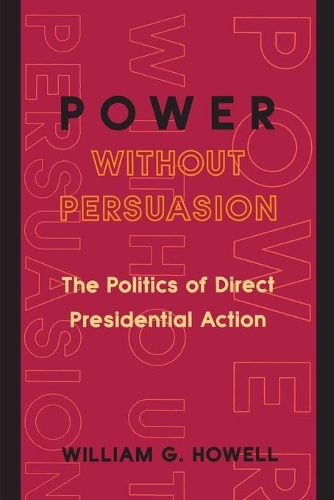
Power without Persuasion: The Politics of Direct Presidential Action
(Paperback)
Publishing Details
Power without Persuasion: The Politics of Direct Presidential Action
By (Author) William G. Howell
Princeton University Press
Princeton University Press
7th October 2003
United States
Classifications
Professional and Scholarly
Non Fiction
Political structures / systems: democracy
Political leaders and leadership
321.80420973
Short-listed for Choice Magazine Outstanding Reference/Academic Book Award 2004
Physical Properties
Paperback
264
Width 152mm, Height 235mm
397g
Description
Since the early 1960s, scholarly thinking on the power of U.S. presidents has rested on these words: "Presidential power is the power to persuade." Power, in this formulation, is strictly about bargaining and convincing other political actors to do things the president cannot accomplish alone. Power without Persuasion argues otherwise. Focusing on presidents' ability to act unilaterally, William Howell provides the most theoretically substantial and far-reaching reevaluation of presidential power in many years. He argues that presidents regularly set public policies over vocal objections by Congress, interest groups, and the bureaucracy. Throughout U.S. history, going back to the Louisiana Purchase and the Emancipation Proclamation, presidents have set landmark policies on their own. More recently, Roosevelt interned Japanese Americans during World War II, Kennedy established the Peace Corps, Johnson got affirmative action underway, Reagan greatly expanded the president's powers of regulatory review, and Clinton extended protections to millions of acres of public lands.Since September 11, Bush has created a new cabinet post and constructed a parallel judicial system to try suspected terrorists. Howell not only presents numerous new empirical findings but goes well beyond the theoretical scope of previous studies. Drawing richly on game theory and the new institutionalism, he examines the political conditions under which presidents can change policy without congressional or judicial consent. Clearly written, Power without Persuasion asserts a compelling new formulation of presidential power, one whose implications will resound.
Reviews
One of Choice's Outstanding Academic Titles for 2004 "This must read shows the civics text version of the US system turned upside down."--Choice
Author Bio
William G. Howell is Assistant Professor of Government at Harvard University. In 2001 he received both the E.E. Schattschneider Award for the best dissertation in American politics, from the American Political Science Association, and the Center for Presidential Studies prize for the best dissertation on the presidency.
